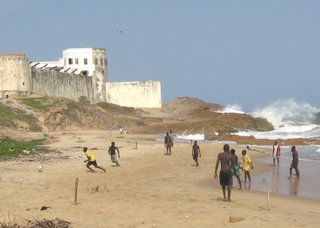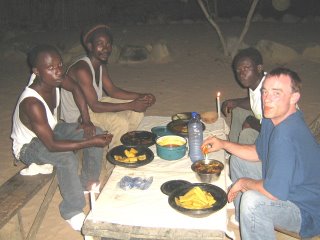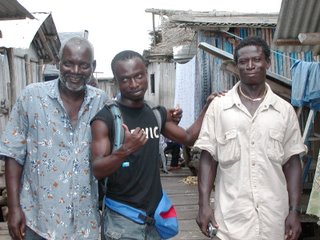The Tourist Triangle in Ghana
 I am posting this as a blog for all the questions that people have about travel in Ghana. If you just want photos, use the link at the end of this posting.
I am posting this as a blog for all the questions that people have about travel in Ghana. If you just want photos, use the link at the end of this posting.Let me start by simply stating I had the *GREATEST* time. I sweated thru everything I had brought to wear within 48 hours, but otherwise it could not have been a more enjoyable holiday. The people were hospitable and kind and mostly honest. The sun was blazing and the humidity was intense. The sights were fantastic and there was a new adventure each day.
I landed in Accra, the capital city of 2 million and delivered a large box of medicine, condoms and children's clothing to
 Dr. Naa Ashily at the West Africa AIDS Foundation, http://www.waafweb.org/. My friend Benjamin helped me to make this “very special delivery”, as he called it. It was very much needed by the clinic.
Dr. Naa Ashily at the West Africa AIDS Foundation, http://www.waafweb.org/. My friend Benjamin helped me to make this “very special delivery”, as he called it. It was very much needed by the clinic.Thanks to Maurice at Aid for AIDS/Africa in Oakland, http://www.aidforaidsafrica.org/, for securing the medicine for me to take. It was mostly donated unused medicine. Any donations are gladly accepted.
The 'Tourist Triangle' is a common tourist route across Ghana. One point of the triangle is Accra on the coast. Kumasi, the second largest city is at the top of the triangle, and the city of Cape Coast along the Atlantic coast being the other point of the triangle.
This link is for my online album of the best 300 photos that were taken on this trip:
My first Ghana album
There are a dozen other Ghana albums that hold the entire set of photos taken if you are really into it. Between me and my guides, we were somehow able to snap 1.5 gig of photos!
Please feel free to post comments in this blog.
Steve













































